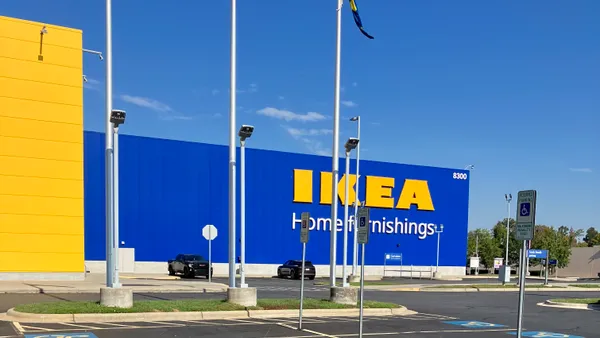Dive Brief:
- Facing new tariff rates and negative consumer reaction to DEI initiative changes, Target’s first-quarter merchandise sales dropped about 3.1% year over year to $23.4 billion, according to a company press release Wednesday. Net sales decreased 2.8% to $23.8 billion and operating income increased 13.6% to $1.5 billion
- The retailer’s comps dropped 3.8% in Q1, with comparable store sales down 5.7% and digital sales up 4.7%. Target updated its guidance for the full year, now expecting a low-single-digit decline in sales, instead of its previously predicted growth of around 1%.
- Target also announced executive team changes and the creation of “a multi-year Enterprise Acceleration Office,” which is intended to “drive even greater speed and agility” at the company. Chief Operating Officer Michael Fiddelke will oversee the effort. Chief Strategy and Growth Officer Christina Hennington, once considered a potential successor to CEO Brian Cornell, and Chief Legal and Compliance Officer Amy Tu will depart the retailer over the coming months.
Dive Insight:
Target has faced a variety of obstacles this past quarter, and it’s difficult to reliably estimate the individual impact of each factor, Cornell noted on a Wednesday earnings call.
“For several years now, we’ve seen pressure in our discretionary business,” Cornell said on the call. “On top of those ongoing challenges, we faced several additional headwinds this quarter, including five consecutive months of declining consumer confidence, uncertainty regarding the impact of potential tariffs and the reaction to the updates we shared on belonging in January.”
Announced just a few days after President Trump’s inauguration, Target in January ended some of its diversity efforts, including no longer participating in third-party diversity surveys and changing its “supplier diversity” team name to “supplier engagement.” Consumer backlash ensued, including boycotts, and further company boycotts are planned, according to various reports.
But the larger macroeconomic headwinds at play were a focus of Wednesday's call.
In mitigating the impact of evolving tariff rates in the U.S., Cornell stressed that price hikes are seen as a “last resort.” However, Chief Commercial Officer Rick Gomez did say that mitigation efforts thus far have included negotiating with vendor partners, changing the country of production where able and adjusting prices where necessary.
Target changed its presentation of revenue earlier this year when reporting its 2024 results, now combining its sales, other revenue and total revenue lines into a singular metric, called net sales. A deeper look into its Q1 results shows a year-over-year decline in sales across all but one of its merchandise categories, with food and beverage seeing a sub-one percent increase.
Overall, the results were a disappointment to the company and analysts.
“They are emblematic of a business that has made too many mistakes and has lost its way on several fronts,” GlobalData Managing Director Neil Saunders said in emailed comments. “It needs to intensify the occasional flashes of greatness, such as its designer collaborations, especially so as the economy enters a more uncertain period.”
Some long-standing issues include its “poor” inventory systems, a lack of newness in its merchandise and a worsening consumer experience with new restrictions to services like self-checkout, per Saunders.
For its new Enterprise Acceleration Office, Fiddelke will oversee efforts to advance company priorities and simplify processes via technology.
The retailer had already announced a five-year merchandise revamp plan in March, which also included a focus on initiatives to scale digital capabilities and “drive meaningful top-line and bottom-line growth.” In the past few months, the retailer launched new or refreshed private label offerings and exclusive partnerships with smaller brands, such as home textile company Parachute.
On Monday, Target announced Target Circle 360 members can now order unlimited same-day delivery “without price markups” from over 100 other retailers and grocers in Shipt’s network.
Announcing further executive shifts on Wednesday, Chief Information and Product Officer Prat Vemana will lead Target’s global capability center in India and report directly to Cornell. Additionally, Chief Financial Officer Jim Lee will now lead enterprise strategy and partnerships, while Gomez will oversee the enterprise insights team.
In departing the company, Hennington (once considered a potential CEO successor to Cornell, per Saunders) ends a more than 20-year career at Target. Tu had only been at the retailer since August of last year, and her role will be filled by Chief Human Resources Officer Melissa Kremer while an external search is conducted.
But can all the strategic changes yield quick results?
“The year has started below plan, but with more difficult prior year comparisons and increased tariff pressure, we do not see a reason for near-term improvement from a disappointing 1Q,” Managing Director and Senior Research Analyst Bill Kirk at Roth said in an emailed note.














